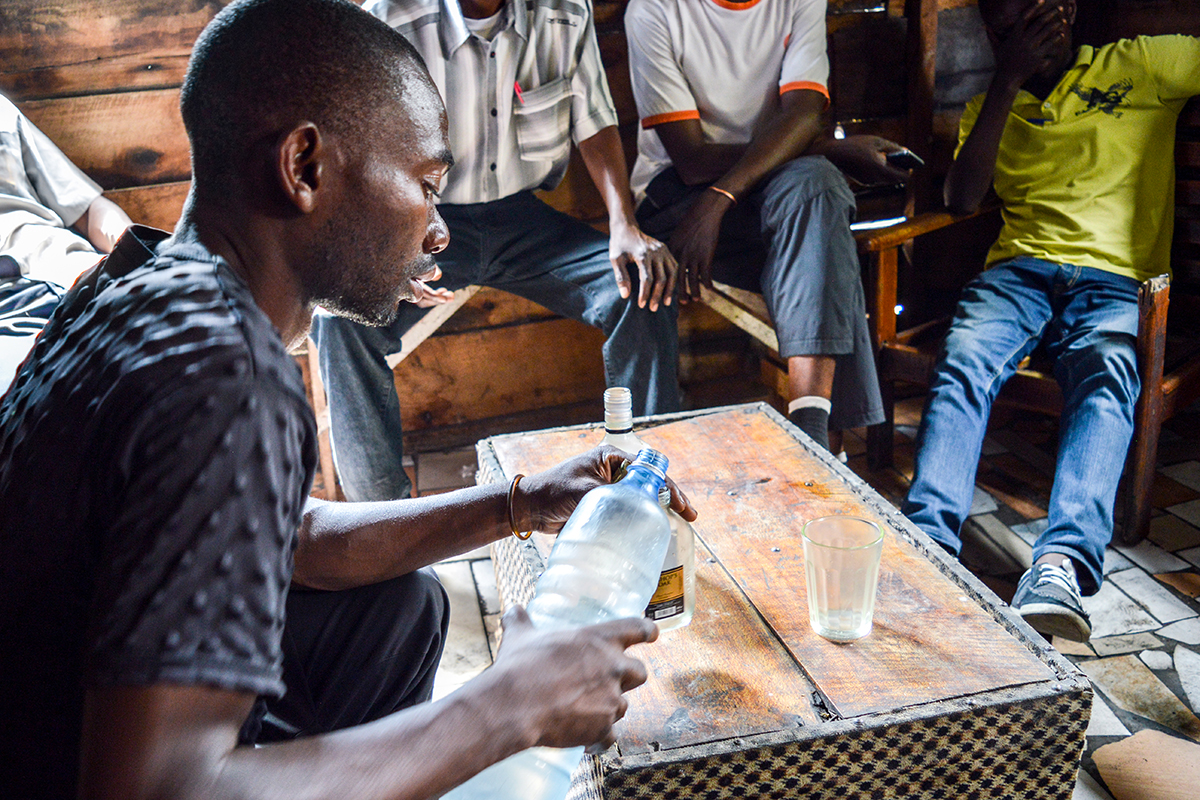
Evelyne Kavira Mathe, GPJ DRC
Jacqueline Kabuo prepares her own brand of rutuku, a vodka made from corn and cassava root, using locally-made distilling equipment.
GOMA, DEMOCRATIC REPUBLIC OF CONGO — Little girls as young as five are in charge of keeping the birds away. Nearby, the corn kernels and cassava roots that Jacqueline Kabuo needs to run her business dry in the sun.
Kabuo is many things: a widow, a mother of six, an entrepreneur and a distiller. But in Goma, the capital of DRC’s North Kivu province, she is most famous for her unique and powerful recipe for vodka, known here as rutuku.
“Many people are big fans of rutuku because it’s dirt cheap,” Kabuo says, adding that she produces 40 liters per week. One liter sells for 1,500 Congolese francs ($1).
At an estimated more than 50 percent alcohol, rutuku is popular among locals.
Kabuo never went to school for chemistry, but her customers say her brewing process suggests otherwise. With a shrug, she says she learned the art of distilling by trial and error.
“A friend of mine revealed an easy recipe for me to try, and I successfully managed to improve on the recipe,” she says, adding that she carefully watches the temperature to ensure “the alcoholic vapor is condensed back into a highly sought-after liquid, known as vodka.”
Kabuo uses locally-made brewing equipment to collect the vapors and condense them into her potent alcohol. A single batch can take up to a week to make.
While her product is popular, some say it’s dangerous. The unmeasured alcohol levels make the brew potent enough to kill, opponents say.
Rutuku is a distilled craft liquor common in DRC. The liquor is made from a mixture of corn and cassava chips that are ground in a mill, or crushed in a mortar, then fermented in a sealed barrel. Kabuo uses a vat and a half vat, which are connected by pipes to receptacles where the alcohol condenses into droplets and collects.



While admiring her natural talent, Jules Chizungu, 44, a biologist at the Laboratory AMI-Labo De Goma, says Kabuo’s product could pose health risks.
“Even if this woman hasn’t been to school, she unknowingly puts chemical concepts into practice by heating her product to boiling, and finally recovering the distilled water that contains ethanol,” he says. “But she has a shaky grasp of the alcohol content of her homemade distilled alcoholic beverage.”
Though producers say they operate without a problem, the production and sale of rutuku is illegal in DRC thanks to its high alcohol content, which amateur distillers often don’t measure.
But Lucien Katambwe, the head of the Katoyi neighborhood, where Kabuo lives, says the accusations aren’t fair. He says he doesn’t know of anyone who met death at the hands of her vodka.
“I’ve yet to hear of anyone who died as a result of consuming her brew, because she makes her vodka in a way that helps her make it harmless,” Katambwe says.
There are no recorded cases of death attributed to her product.
Ferdiane Baseme, 50, is a longtime customer. She says she has been drinking rutuku for many years and that she enjoys it because it’s made from natural ingredients.
“I love this brew because it’s an all-natural drink that tastes like whiskey. I often drink it to quench my thirst, and, most interestingly, it’s priced low,” she says, taking a sip.
But for others, like Bientôt Rwabika, 45, Kabuo’s rutuku is a threat to health.
“I can’t even take this drink because it affects people’s strength, and skinny people are particularly advised not to drink this kind of vodka. Worse still, it has long-term impact on the brain,” he says.
Despite the controversy, Kabuo’s business has created a strong network of other businesses.
Yvette Zawadi, 45, has been a wholesale customer of Kabuo’s for 10 years. Her business – buying and reselling the rutuku – is profitable, she says.
“My business is running well,” Zawadi says. “Today, I can afford to create a proper learning environment for my kids and am able to cater to some of my needs.”
To ensure her product is safe and continues to improve, Kabuo wants to learn more about chemistry and business.
“I yearn for more knowledge and means to improve my business,” she says.
Ndayaho Sylvestre, GPJ, translated the article from French.







